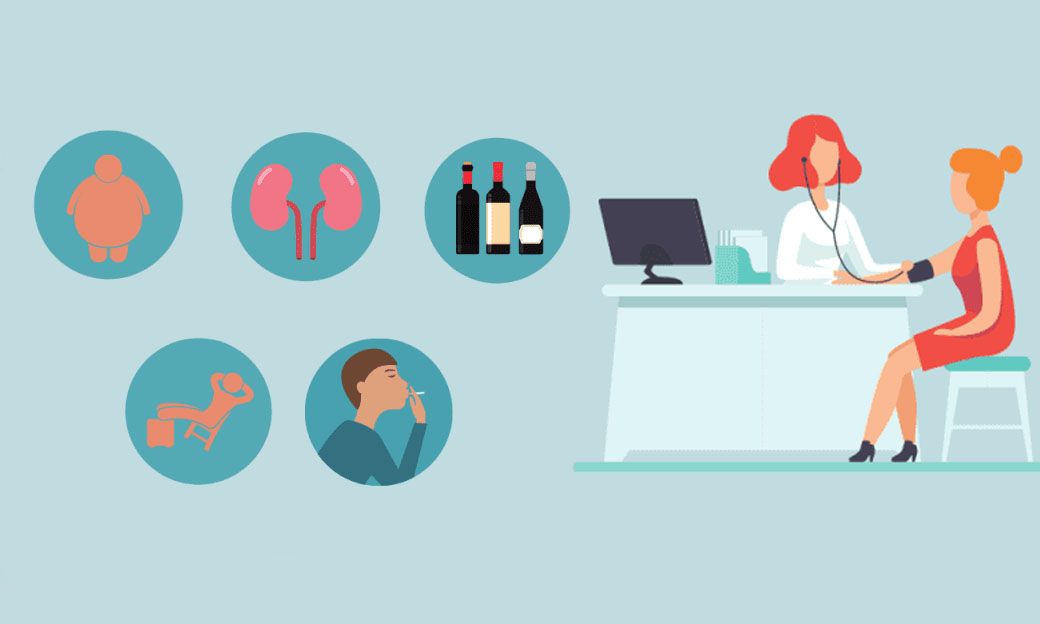
High blood pressure, or hypertension, is one of the most common yet dangerous health conditions worldwide. Often called the "silent killer," it typically has no symptoms but can lead to life-threatening complications such as heart disease, stroke, kidney failure, and vision loss if left unmanaged. Understanding what puts you at risk is the first step toward prevention and control.
Know Your Risk
Everyone should take the time to evaluate their risk of developing high blood pressure. Some risk factors are non-modifiable, meaning you can’t change them, while others are modifiable, meaning they can be influenced through lifestyle changes or medical treatment.
Here are some non-modifiable risk factors:
1. Age: Blood pressure tends to rise as you get older. Men over 45 and women over 65 are at higher risk.
2. Family History: If you have close relatives (parents or siblings) with hypertension, your risk increases.
3. Race or Ethnicity: African Americans tend to develop high blood pressure more often and at an earlier age than people of other racial backgrounds.
4. Gender: Men are more likely to develop high blood pressure before age 55, while women are more likely to develop it after menopause.
Understanding these factors can help you be more proactive about monitoring your health, especially as you age.

Conditions That Can Increase Risk
Certain medical conditions can make you more susceptible to high blood pressure. If you already suffer from any of these, it’s essential to manage them carefully:
1. Chronic Kidney Disease (CKD): The kidneys play a vital role in regulating blood pressure. If they are damaged, they may not filter fluids and waste properly, leading to fluid buildup and increased blood pressure.
2. Diabetes: High blood sugar levels can damage arteries and increase the risk of plaque buildup, narrowing the blood vessels and raising blood pressure.
3. Sleep Apnea: People with this condition stop breathing repeatedly during sleep, which causes stress on the cardiovascular system and can raise blood pressure levels over time.
4. Thyroid Disorders: Both overactive and underactive thyroid glands can influence blood pressure by affecting heart rate and blood vessel function.
5. High Cholesterol: When cholesterol builds up in arteries, it limits blood flow, forcing the heart to work harder and increasing blood pressure.
Managing these underlying health problems through medical treatment, lifestyle changes, or both can significantly reduce the risk of hypertension and its complications.

Behaviors That Can Increase Risk
Your everyday habits can directly impact your blood pressure. Here are modifiable behaviors that may lead to hypertension:
1. Unhealthy Diet: Diets high in salt (sodium), saturated fats, and processed foods can raise blood pressure. Too much sodium causes the body to retain water, which increases blood volume and pressure on artery walls.
2. Physical Inactivity: A sedentary lifestyle weakens the heart and contributes to weight gain, both of which can elevate blood pressure.
3. Smoking: The nicotine in tobacco products causes blood vessels to narrow and the heart to beat faster, raising blood pressure. Long-term smoking also damages blood vessel walls.
4. Excessive Alcohol Use: Drinking too much alcohol can raise blood pressure and interfere with the effectiveness of medications used to treat it. It can also lead to weight gain, further compounding the risk.
5. Chronic Stress: Persistent stress may lead to unhealthy coping mechanisms such as overeating, smoking, or drinking. In addition, stress hormones can temporarily increase blood pressure.
6. Poor Sleep Habits: Lack of quality sleep or irregular sleep patterns can affect hormone balance and cardiovascular health.
Making even small changes in these behaviors can lead to meaningful improvements in blood pressure and overall health. Regular exercise, a heart-healthy diet, quitting smoking, limiting alcohol, and managing stress effectively can make a significant difference.

High blood pressure is a complex condition influenced by a combination of genetics, existing health problems, and lifestyle choices. While some risk factors are beyond your control, many can be changed or managed. The key to prevention is awareness—know your numbers, understand your risks, and take active steps to lead a healthier life.
Subscribe means that you have read and agree to the Privacy Policy.
Subscribe means that you have read and agree to the Privacy Policy.
Copyright © Shenzhen Pango Medical Electronics Co.,Ltd, Ltd. All Rights Reserved.